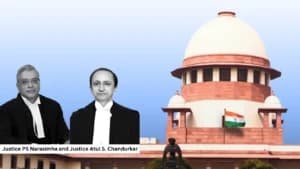The Delhi High Court recently ruled that the absence of direct recovery of narcotic substances from an accused does not automatically warrant the granting of bail if there is clear evidence linking the accused to a narcotic network.
Justice Shalinder Kaur emphasized,
“Mere assertions or absence of recovery from the accused may not suffice when the material on record prima facie discloses a nexus with a narcotic network. The gravity of the offence, coupled with the organized nature of the criminal activity, justifies a more cautious approach in the grant of bail under the NDPS Act.”
Read also: Medha Patkar Withdraws Plea Against Defamation Conviction in Delhi High Court
The case involved a petitioner seeking bail under FIR No. 337/2022, registered for offences under Sections 21 and 29 of the NDPS Act and Section 14 of the Foreigners Act. The police had received credible information about a narcotic network involving heroin trafficking. During a raid, authorities seized Rs. 2.29 lakh in cash and property documents suspected to be proceeds from drug sales. The petitioner and his brother were present at the scene.
Upon interrogation, the petitioner allegedly revealed connections with Nigerian nationals supplying heroin. Searches later led to the recovery of 500 grams of heroin from a Nigerian national’s residence and 360 grams from another co-accused, all linked to the petitioner’s leads.
The petitioner argued that no recovery was made directly from him and sought bail based on the principle of parity with a co-accused who had been granted bail earlier. However, the State countered with evidence including call records, intercepted voice communications, and previous criminal records, showing the petitioner's active role in the syndicate.
Justice Kaur observed,
"When an accused is alleged to be involved in a narcotic network, the bar under Section 37 of the NDPS Act assumes heightened significance. The involvement in an organized network indicates a deeper and more structured participation, raising serious concerns about potential reoffending, tampering with evidence, or influencing witnesses if released on bail."
Read also: Delhi High Court Criticizes Delhi Govt and DDA for Delayed Construction of Judges' Residences
The Court highlighted that under Section 37 of the NDPS Act, bail can only be granted when there are reasonable grounds to believe that the accused is not guilty and is unlikely to commit any offence while on bail. In this case, the petitioner's active involvement in the narcotic network was established through prima facie evidence.
Therefore, keeping in view the serious allegations, prior criminal involvement, and the organized nature of the crime, the Court dismissed the bail application.
Case title: Praveen vs. State Govt Of NCT Of Delhi (BAIL APPLN. 4256/2024)
![[NDPS Act] Mere Absence of Recovery Not Enough for Bail if Nexus with Narcotic Network Exists: Delhi HC](/_next/image?url=https%3A%2F%2Fs3.courtbook.in%2F2025%2F03%2Fndpc-act-1.webp&w=2048&q=75)













